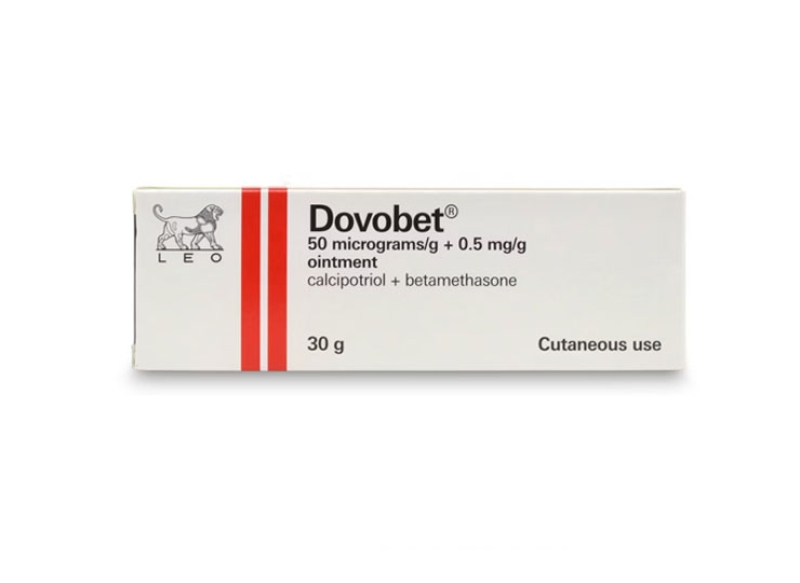Dovobet is a medication used to treat psoriasis. It’s available as an ointment or as a gel. The ointment is used for plaque psoriasis whereas the gel is most often prescribed for scalp psoriasis.
Dovobet contains two active ingredients: calcipotriol and betamethasone dipropionate. Each gram of gel or ointment contains calcipotriol 50 micrograms and 0.5 mg of betamethasone. Calcipotriol is known as a vitamin D analogue and betamethasone is a corticosteroid.
Calcipotriol works by slowing the production of skin cells and bringing the rate of skin cell growth back to normal. Betamethasone works by reducing inflammation, which helps to improve symptoms such as itching and soreness.
The gel or ointment should only be applied once a day to affected areas. Most people find it more convenient to apply it in the evening.
The instructions for use differ slightly for the ointment and gel. The gel is more suitable for scalp psoriasis, although it can still be applied to other areas of skin with psoriasis.
Do not use more than 15 grams in one day. If you use other calcipotriol containing medicines, the total amount of calcipotriol medicines must not exceed 15 grams per day and the area treated should not exceed 30% of the total body surface.
In the event you miss a dose, it is safe to apply the missed dose as soon as possible. However, if enough time has passed that you should be applying your next dose instead, simply skip the missed dose and resume your typical application schedule.
The usual treatment period is a maximum of 4 weeks, but your doctor may decide on a different treatment period. If you feel you need to continue treatment for longer than 4 weeks, you should have a review with your doctor to discuss this first. If your condition does not improve after 7-10 days of use or worsens, you should stop treatment and contact your doctor.
Follow the instructions below to ensure appropriate use of this medication:
- Remove the cap and check that the seal in the tube is not broken before you first use the ointment
- Squeeze the ointment onto a clean finger
- Rub gently into your skin to cover the affected area of psoriasis until most of the ointment has disappeared into the skin
- Do not bandage, tightly cover or wrap the treated skin area
- Wash your hands well after usingDovobet (unless you are using the ointment to treat your hands). This will avoid accidentally spreading the ointment to other parts of your body (especially the face, scalp, mouth and eyes)
- Do not worry if some ointment accidentally gets on normal skin near your psoriasis, but wipe it off if it spreads too far
- In order to achieve optimal effect, it is recommended not to take a shower or bath immediately after application of Dovobet ointment
Always use this medication exactly as your clinician has told you. Check with our clinical team or your GP or pharmacist if you are not sure.
Medicines and their possible side effects can affect individual people in different ways. The following are some of the side effects that are known to be associated with this medicine. Just because a side effect is stated here, it does not mean that all people using this medicine will experience that or any side effect.
Common side effects include:
- Itching.
- Rash.
- Burning sensation of skin.
Uncommon side effects include:
- Skin pain or irritation in area of use.
- Inflammation of the hair follicles (folliculitis).
- Inflammation of the skin (dermatitis).
- Reddening of skin.
- Changes in skin pigmentation in area of use.
- Worsening of psoriasis.
If you notice your psoriasis worsens while using this medicine, stop using it and contact your doctor as soon as possible. If you notice any symptoms of an allergic reaction after applying this treatment, seek medical attention immediately.
For full information on side effects and correct use, see the patient information leaflet. If any side effects concern you, or you are experiencing any of the side effects mentioned in the patient information leaflet whilst taking this medication, please contact our clinical team or speak to your GP.
Dovobet isn’t suitable for everyone to use. You should not use this if you have problems with calcium levels in your body; and if you’re allergic to betamethasone, calcipotriol or any of the other ingredients in the gel or ointment.
It should also not be used by people with specific types of psoriasis such as erythrodermic, pustular, or exfoliative psoriasis.
It should not be applied to any areas of infected skin (such as a viral, fungal or bacterial infection). This treatment is not suitable for other skin conditions such as acne, rosacea and perioral dermatitis.
Get emergency medical help if you have signs of an allergic reaction to this medication. These include:
- Hives
- Dizziness
- Fast or pounding heartbeats
- Wheezing
- Difficult breathing
- Swelling of your face, lips, tongue, or throat.
It is important that you let us know which prescription, over-the-counter medicines and recreational drugs you are currently taking. You must also tell us about any other medical conditions that you currently have (or had in the past). This will help us ensure the prescribed medication is safe and appropriate for you to take.
For full information on warnings, medication interactions and contraindications, refer to the Patient Information Leaflet. Please read all packaging and the Patient Information Leaflet before taking any new medicine and inform our clinical team or your GP of medicines you are taking or intend to take.










